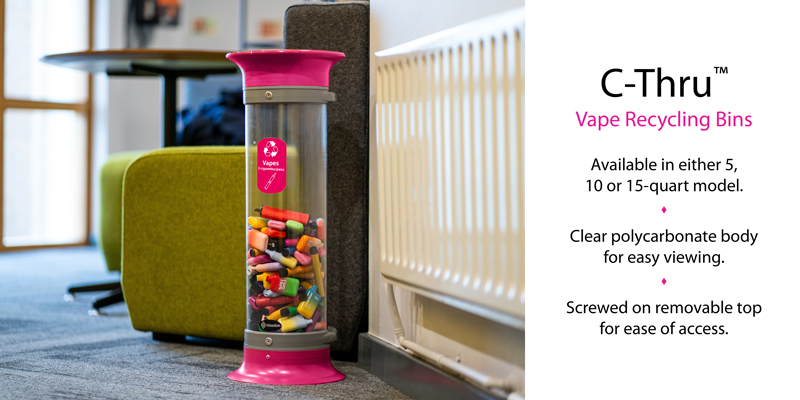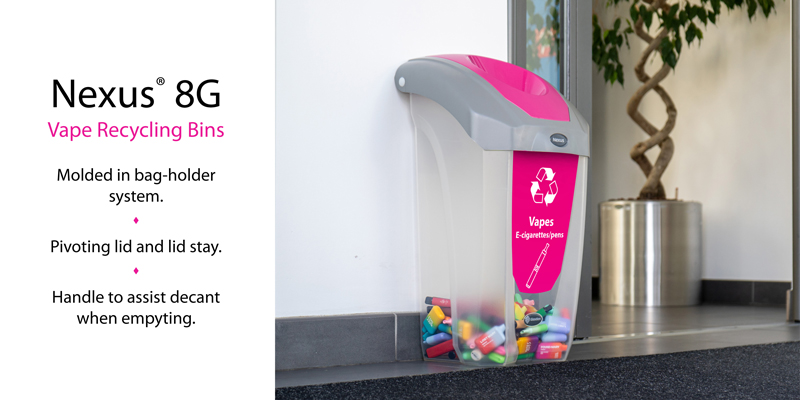Vaping is becoming increasingly widespread, and with it comes a growing concern about the environmental impact of disposable vaporizers and the materials they contain.

As a nation that prioritizes environmental conservation, we are committed to minimizing paper waste, restricting plastic pollution, and preventing the introduction of harmful chemicals into the environment. One way we are achieving this is by discouraging cigarette smoking.
According to the World Health Organization (WHO), cigarette filters contain microplastics and constitute the second-highest form of plastic pollution worldwide. When cigarettes are incorrectly disposed of, not only is the plastic dumped, but also 7000 toxic chemicals are released, posing a serious risk to the surrounding environment.*
However, some habits are hard to kick, and many smokers have turned to electronic cigarettes, more commonly known as vapes, as an alternative.
A Vaping Revolution
Over the past decade, vapes have become a more accessible, trendy, and alternative way to consume nicotine. Once a simple business model, now a thriving industry that brings in billions each year, with Americans buying close to 12 million units each month.* In 2023, the global vape market was valued at 28.17 billion USD and is expected to grow at an annual rate of 30.6% from 2023 to 2030.*
The vaping industry has evolved significantly since its beginning. Consumers now have access to devices with substantially better battery life, advanced atomizers, optimal vaping temperatures, and a vast range of visually appealing designs and e-liquid flavors. These technological advancements and user design enhancements, along with high demand across North America, Asia, and Europe*, have contributed to the rapid growth of vaping, particularly disposable vapes.
Disposable vapes are small, colorful, and engaging devices composed of a plastic casing, a lithium-ion battery, nicotine-infused liquid, and a host of other materials and chemicals. The result is a product designed to be discarded after use, but this raises the question: Are disposable vapes safe for the environment?
It’s important to remember that whilst vaping can (currently) be a much safer alternative for our bodies than smoking, everything we consume will impact our ecosystem.
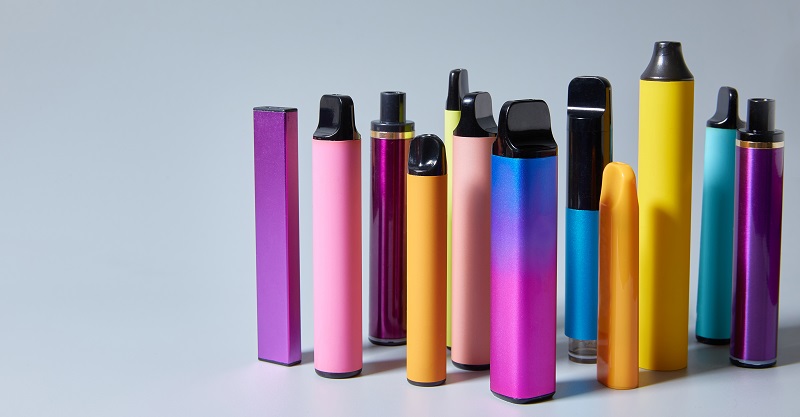
The Lithium-Ion Issue
Each disposable vape contains several precious and hazardous chemicals or materials, most notably – lithium from the lithium-ion batteries.
Lithium is expected to play a critical role in the transition to green energy. Unfortunately, researchers estimate that we throw away more than 600,000 tons of lithium batteries* and recycle less than 5% of them at the end of their lives.* Improperly disposed of batteries also pose a significant environmental hazard. They are capable of corroding and leaking into the ground, polluting our soil and water by releasing metals and chemicals. Furthermore, irresponsibly discarding vapes in the garbage poses a fire hazard because the batteries can explode or cause a fire when compacted in garbage trucks and landfills.*
Vapes also contain several other components that can cause serious harm to humans, animals and the planet. The most prominent is plastic, which most - if not all - brands use to form a device's colored shell. Unfortunately, the plastic used to manufacture vapes is non-degradable. Other components include copper, rubber and even glass, all of which; also do not decompose easily when discarded into landfill sites.
Call to Action
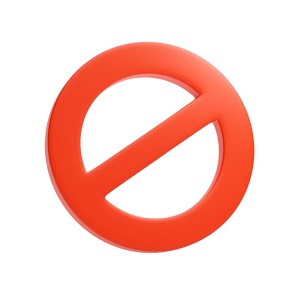
Most vape bans in the U.S. occur at the state and local levels. While some California cities, such as San Francisco, have banned the sale of all vaping products, most American vape restrictions involve flavors and online sales.*
Albeit, while no concrete plans are in place to ban vaping outright, the current resolution is to utilize Vape Recycling Containers for safe and efficient disposal. As with any type of electrical waste, recycling is vital.
Best Practices for Safe Disposal
So, what's the best method for safely recycling disposable vapes? While all disposable vapes differ in shape and design, they typically consist of the same components. This includes a non-rechargeable lithium-ion battery, a pod containing an atomizer (the part that heats up to turn the liquid into vapor), e-liquid, a cotton wick, as well as wiring and circuitry. All these items are encased in a plastic casing. The good news is that all parts of a disposable vape can be recycled.

Although it may be recommended by certain sources to disassemble a device and separate the battery from the casing, doing so can pose risks because of the flammable nature of lithium-ion batteries. Therefore, it is important to exercise caution if attempting this method. If you can handle the battery safely, it is best to bring it to a recycling center or place it in a designated Battery Recycling Container for proper disposal and future recycling.
The best approach is to safely collect and store the vapes whole in a dedicated vape recycling container. Once collected, you or your organization can choose one of the following options for disposal:
With Your Local Vape Store
Check with your local vape store to see if they have a disposable vape recycling program in place. Simply bring in your used disposables when you're finished. If you don't have a nearby vape shop, a quick Google search can help you find one and you can inquire about their disposable recycling options over the phone.
At Your Local Household Hazardous Waste Facility
Since every state has different regulations regarding the disposal of disposable vapes, we suggest you start with your local government.
Listed below are databases containing information about both local government facilities and private sector businesses that handle electronic and battery recycling. The most suitable option would be to utilize the services of Household Hazardous Waste (HHW) Facilities, as they have the necessary resources for proper disposal of disposable vapes.
By choosing one of these options, vapes are guaranteed to enter a recycling center. Here, batteries are safely removed and the device is dismantled using automated and manual techniques. The components are classified according to their material characteristics, such as metals or plastics, and sanitized afterwards. Collectible substances are sent to relevant experts – such as plastics for further treatment and metals to smelters.
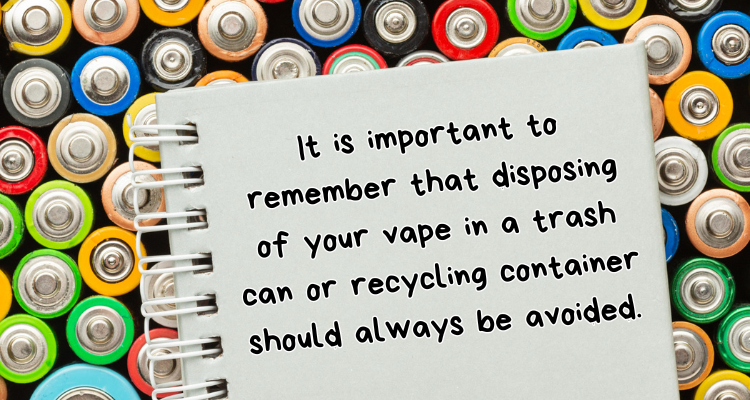
How Can an Organization Act?
The first port of action is to ensure that vape users have access to the correct knowledge and resources to handle and dispose of their vaping products responsibly.
For disposal, Glasdon offers a range of collection tubes and containers with brightly colored apertures and graphics to encourage responsible disposal. These containers are ideal for businesses, offices, retail, and educational establishments. Their transparent design helps reduce cross-contamination, which will play a vital role in recycling such hazardous content.
What Else Can Be Done?
Education
It is essential to educate and raise awareness about the hazards of improper disposal of vapes, in order to ensure that you or your organization prioritize recycling vapes.
Switch to Reusable
Make the switch to refillable & rechargeable vapes. Granted, while they still utilize the same materials and components, opting to ditch the disposable and move the reusable is highly beneficial for the environment and could even save you money in the long run!
For more information on the topic discussed in this article, please Contact Us or talk to a member of our LiveChat service now.
References
https://www.who.int/news/item/31-05-2022-who-raises-alarm-on-tobacco-industry-environmental-impact#:~:text=The%20WHO%20report%20%E2%80%9CTobacco%3A%20Poisoning,further%20contributing%20to%20global%20warming.
https://www.verywellhealth.com/disposable-vapes-waste-8384147#citation-7
https://www.grandviewresearch.com/industry-analysis/e-cigarette-vaping-market
https://www.grandviewresearch.com/industry-analysis/e-cigarette-vaping-market
https://global-recycling.info/archives/6979
https://grist.org/politics/most-lithium-batteries-end-up-in-a-landfill-a-new-bill-aims-to-change-that/
https://www.ansrmn.org/the-environmental-impacts-of-vaping-that-the-tobacco-industry-doesnt-want-you-to-know/
https://no-smoke.org/wp-content/uploads/pdf/ecigslaws.pdf

